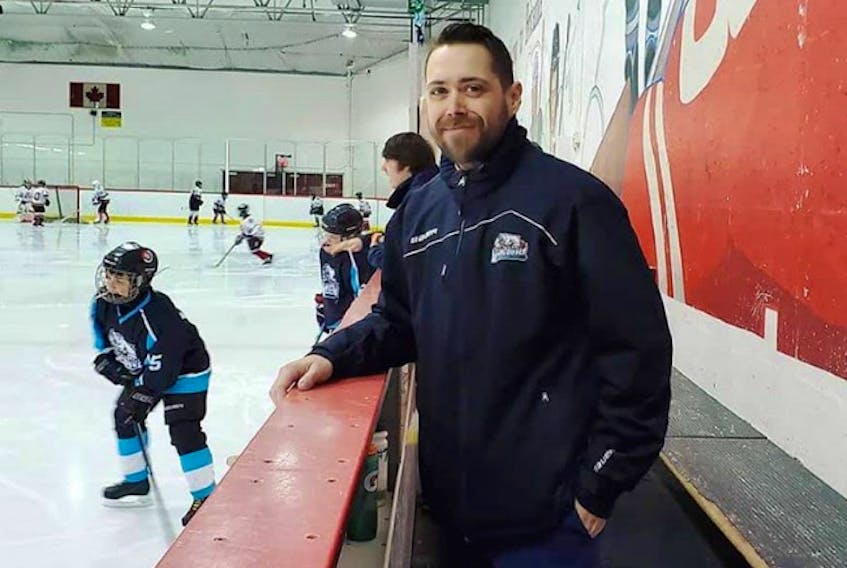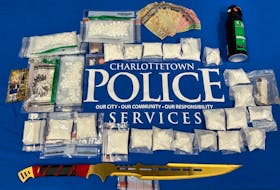SYDNEY, N.S. — A hot shower and a can of Coke.
Those are two of the simple things children’s hockey coach Stephen Gillis says he’s most enjoyed since receiving a life-saving kidney transplant.
On Feb. 18, the Sydney native who lives in Vancouver received a kidney from old friend Michael Teigen, who was inspired to get tested last year to see if he had the same rare O-negative blood type as Gillis after seeing a viral video his peewee hockey players created to help him find a donor.
The surgery was a success. So much so, that Gillis returned to the bench to coach his current Vancouver atom team on Sunday, less than a day after he was released from hospital.

“I was released on Saturday and on Sunday morning I wasn’t going to miss the game — I felt I already missed enough,” said the 39-year-old, who hadn’t missed a game or practice this season before the transplant surgery, despite undergoing four-hour dialysis sessions three days a week.
“Without them, I wouldn’t be sitting here with three kidneys (surgeons typically don't remove a patient’s own kidneys. In Gillis’s case, they opted to leave the old ones dormant and attached the new one near his left pelvis.) I owe them.”
In the days since leaving the hospital, Gillis said the smaller pleasures in life have been the most gratifying.
A catheter that was inserted for his dialysis treatment couldn’t get wet, so he’d been washing with face cloths and towels for more than a year. With the new kidney functioning well, he was finally able to take a shower on Wednesday.
“It was glorious. It’s the little things, when they get taken away from you,” he said. “Just to be able to put my hand on the wall and head under the showerhead, to just be able to do that and stand there and think and all those little things that you do in the shower without thinking about it, it was pretty amazing.”
Warning: Facebook video contains strong language.
Another indulgence was a can of Coca-Cola, something he’d been unable to drink for years because it contains phosphate.
“Not that I’m much of a Coke drinker, but now I need phosphate because I have a new working kidney and the other night I had my first Coca-Cola since forever. Just the freedom to have the choice to do that — even though I’m more of a ginger ale guy — it was amazing.”
His new kidney will now also allow Gillis to travel home to visit family and friends in Cape Breton.
Last summer, he’d wanted to attend his 20th Riverview High School reunion but couldn’t because the Cape Breton Regional Hospital dialysis unit didn’t have any openings.
He’s also thinking about going to Florida with his girlfriend Danielle Smith, who is also from Sydney, to watch the WWE’s signature event.
“We’re talking about maybe going to WrestleMania in Tampa. I’m still a wrestling fan and I’ve somehow roped my girlfriend into — we just went to Smackdown, which was in Vancouver a couple of weeks ago and she loved it — so I’m thinking about buying tickets. I may pull the trigger on that in the next day or two,” said Gillis, who produces curriculum films for the University of British Columbia’s medical program and in 2000 directed the documentary “This Wrestling Life,” which offers an insider look at the world of professional wrestling.

Gillis, who must take two anti-rejection drugs twice a day for the rest of his life, is scheduled to return to work until June. He must still visit the hospital twice a week for bloodwork for the next six weeks. That will eventually become bi-weekly and then monthly.
He said he will coach his team until the season ends in mid-March and continue to strongly advocate for organ donation.
He said he supports the presumed-consent legislation the Nova Scotia government and other provinces have passed that makes everyone a potential organ and tissue donor unless they opt out.
“Why not have more people in the pool? My recommendation is, considering one in 10 people have kidney disease, there’s lungs, there’s the heart, there’s eyes — your donation, which you don’t have to take with you, can save up to eight lives. And you live on in a sense. Otherwise, you don’t."
In the meantime, he’ll be busy trying to find ways to repay Teigen, who he said is recovering quickly and has become like a “big brother and best friend” since they reconnected.
“All he has to do is text me and I’m at his beck and call, whatever he needs,” Gillis said. “I’m going to just try to keep surprising him with good things and deeds and do whatever he needs and tell him he’s good looking all the time and funny. Just constant compliments. He’s a hero and he’s an example for all of us. He’s the type of people we need.”
Gift of Life
• A single organ donor can save up to eight lives by donating kidneys, liver, heart, pancreas, lungs and small bowel
• A single tissue donor can save or improve the lives of 50-80 people by donating tissue such as bone, skin and corneas
• Anyone can be an organ donor, and if you are 70 years old or younger you have the potential to donate tissue. Patients who plan to receive medical assistance in dying may also choose to donate organs and/or tissues as part of their end of life care
• To download the organ and tissue donation form, visit https://novascotia.ca/DHW/msi/docs/MSI-Health-Card-Renewal-Form.pdf, fill it in and sign it, then mail to MSI Registry and Enquiry P.O. Box 500, Halifax, NS, B3J 2S1, or fax to 902-481-3160. If you need help with the form call MSI at 902-496-7008 or toll-free at 1-800-563-8880.
SOURCE: Nova Scotia Health Authority









